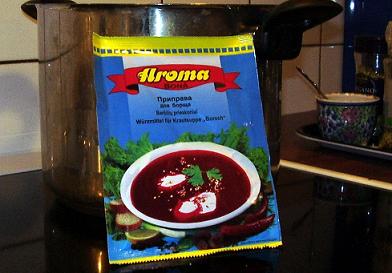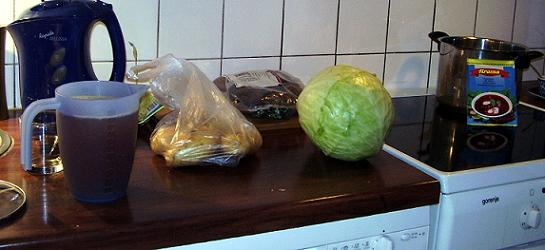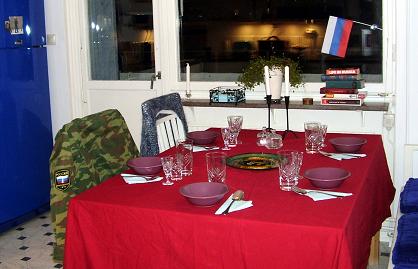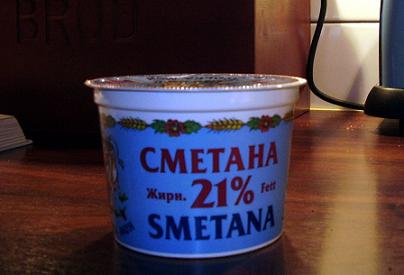Everybody loves борщ [borscht]! Posted by josefina on Feb 7, 2009 in Culture, Traditions
There comes a time in everybody’s life when you need to get a little Russia into your everyday existence. Especially if you’re not currently in Russia, but constantly finding yourself outside of the Russian Federation, and thus persistently living without interacting with Russian culture on a day to day basis. Particularly will you suddenly find yourself craving Russian food. This problem is, however, easy to solve. «А как?» [But how?] you might wonder, and the answer to that question is even easier than the solution – throw a Russian style dinner party! Once again the question «как?» arises, but worry not, dear readers, because today I will show you an uncomplicated trick and at the end of this post you will inevitably exclaim «вот так!» [like that!]. Call some close friends and invite them over for dinner, but tell them only that you plan on cooking «борщ» [borscht], nothing else. The rest will be a pleasant surprise, and – as I would like to call it – the shortest visa-less trip ever possible to the great Eastern Motherland! What you need to create that special Eastern European coziness in the comfort of your own home (kitchen, of course!) isn’t very much, and if you’ve got a Russian store in your neighborhood it is even less. I decided to throw my own Russian style dinner party on my last Saturday at home in Gothenburg, Sweden (I’m currently back in the Urals) and lucky for me, Gothenburg has a Russian store called «Бабушка» [‘Grandmother’] where I could acquire the two essentials – «приправа для борща» [seasoning; flavoring for borscht] and «сметана» [Russian sour crème; ‘smetana’]. The recipe I’m about to share with you is for vegetarian borscht, though real Russian borscht (or Ukrainian borscht, for that matter) is made with meat, as I am well aware of. But I’m a vegetarian, so this is the only way I cook it. Probably many of you have your own special way of preparing borscht, and the way I make is in no way the only ‘canonical’ way of making it. Yet I must take some pride because the borscht I make is to die for. «Обещаю!» [I promise!]

I bought two packages of «приправадляборща», one of them I used to make «бульон» [broth; consommé; bouillon] mixing it with one litre of boiling water. This I used as the ‘foundation’ for the soup; if you make it with meat, then you’ll use the water you cooked the meat in for this. When you make vegetarian borscht it is important to remember two things – to use more spices and more fat, which isn’t needed with meat, since there’s enough spice and fat in meat as it is.

This recipe is enough for six people to get two servings each (it is both Swedish and Russian custom to fill up your guests to the top). You’ll need «дваилитрибольшиекартошки» [two or three big potatoes], «пятьсотграммовкапусты» [500 grams of cabbage], «четыреилипятьсвёкл» [four beets] to start with.

The first thing to do is to cut «одинлук» [one onion] and «четырелодкичеснока» [four garlic ‘boats’ – don’t know the word for it in English, but you know what I mean!] into very fine small pieces and fry them in a big pot. I used over 1 decilitre of olive oil, and I don’t recommend using any less.
All the vegetables need to be cut into small squares, including «однаморковка» [one carrot] and as is the thumb rule in cooking Russian food – when you’re cutting things into tiny pieces, you know you’re on the right track! I would recommend slicing the cabbage with a ‘cheese slicer’ (as seen on the picture above next to the cabbage), though I know that’s an eccentric tool used primarily in Sweden. You could also chop it up with a knife, of course.
Then you put all of the ingredients into the pot, plus some more water, and let it boil for a little while, then putting down the heat and adding some more spices (like salt, pepper, «укроп» [dill] and «петрушка» [parsley] for example). Add about 2 decilitres of tomato paste to make it even fuller and ‘foodier’. Now the only thing left to do while the soup cooks – 30 minutes is minimum, but an hour or two only makes it even tastier – is to set the table. To create that exceptional Russian atmosphere in your own home all you really need to do is to set the table with a red tablecloth (I used a regular sheet for effect), a flag in the window, a couple of Russian books on the window sill, a knitted scarf over one chair, a Russian army jacket over another, a magnet with Medvedev and Russian modern art on the fridge, plus three glasses – for vodka, beer (or wine) and water. The vodka should be Russian, but the beer could be Czech or Polish, and the wine… anything red will do!
Of course there’s no real borscht experience without «сметана»! Start the meal by making a toast with ice-cold «водка» (put it in the freezer for an hour first) and then biting it off with some «огурчики» [salted cucumber]. A good choice for background music is the Russian Army Choir, which has made some excellent discs. The first song to play should of course be the Russian national anthem…
…and then your guests are ready to enjoy your borscht – but don’t forget the bread! It should be «серыйиличёрныйхлеб» [‘grey’ or ‘black’ bread; in other words whole-wheat], white bread in this context is a big no-no.
Incidentally, my dear mother also blogged about this our ‘borscht-experience’ – this is for those of your who are fluent in Swedish, or those who are just curious to see just what kind of outfits is appropriate for such a dinner party as the one suggested above.

Build vocabulary, practice pronunciation, and more with Transparent Language Online. Available anytime, anywhere, on any device.







Comments:
Bruce Dumes:
Thank you so much, Josefina! I love to cook, so I’ll certainly try this. I live in Los Angeles, where there are many little Russian markets, so I think I should be able to find the correct «приправа для борща» and «сметана».
The word for the piece of garlic is a “clove”. I didn’t know that the first time I used it. I was making a roast and the recipe called for a clove of garlic. I didn’t know what a clove was, but I felt sure that it couldn’t be that little piece, so I used the entire bulb of garlic. It was delicious (I love garlic) but my house smelled like garlic for weeks.
One question: I do love meat, so I’ll use it. Do you use just the meat broth, or do you also put pieces of meat in the «борщ»?
What a nice idea to have a Russian dinner party!
Mickey:
@Bruce Dumes The first time I used fresh garlic I thought a “clove” was the WHOLE THING.
My lasangna was a bit wild.
Joke:
I’ve always thought cheese slicers were something typically Dutch! Funny to see that they are used in Sweden as well. I never tried to slice cabbage with it, though. Might be worth a try.
I had борщ once – prepared by a ‘real Russian’ – and it tasted great. But it was a lot of work to make it, so I never tried to make it myself.
Thank you very much for this nice blog!
Michelle:
I learned how to make borscht in Ukraine and love it! Here everyone has their own special recipe. I like mine without meat too but I am not a vegetarian. I have even made it without potatoes to make it less of a heavy meal that that was good too…..Preapetnya appetite! 🙂
Dmitriy:
Так смешно написали про борщ =)
Could I correct some parts? =)
You’ll need «два или три большие картошки» – the right is «две или три большие картошки»
«четыре лодки чеснока» – in russian it should be «четыре зубчика\дольки чеснока» (the whole vegetable is “головка” and the part is “зубчик” like little tooth) =)))
John D. Baker Jr:
J,
Thanks for the Tales of Borshch. All my life, growing up hiding under my school desk during the Cold War, I thought Borshch was RUSSIAN! But about ten years ago, after I started meeting Russians, (and Ukrainians), I learned the Truth, that Borshch is really Ukrainian, one of the many gifts from the Kievan Rus’, (like the Foundation of the Russian Culture) I don’t mean to pick a fight or start resumption of pipeline cut-offs…
Now something else that has puzzled me about this word for Beet Soup. What is the Etymological, Grammatical, Global thing about the transfer into English that a “T” is added when the letter clearly is equivalent to “shch?” Or does this expose my rudmentary level of exposure and understanding?
Still love everything you do here, sans boef er al.
Daniel:
I would like to thank you for all your time spent to inform friends about Russia and its language, Josephine. But first of all I personally thank you, because your notes and posts help me in the studies of Russian language. I am beginner in the University Training as future interpreter of Russian-English-Dutch over Italian, and you posts help me in all what I need…. So, this post is for giving you my appreciate compliments…. I hope to have the same capability you have to develop this language. Actually I am working for Oil Company in Siberia, in Noviy Urengoy. I have done a blog, but actually in Italian… I will appreciate if you have 2 minutes to catch it and give me idea on it. Thanks again, Daniel.
Julien:
Thanks a lot!
For a long time I wanted to make vegetarian Borshtsh (am a vegetarian and some of my friends, too), and this is the perfect time to find this recipe! (via Veronica Khokhlova of globalvoices)
saint facetious:
I find your accessories to be oddly appropriate and mood setting. That place looks exactly like my friend Misha’s apartment in Moscow. Ha!
John D. Baker Jr:
saint facetious,
Did you ever see “Irony of Fate” (1975)? Of course her flat looks exactly like Mischa’s!! Just pray that his key does not fit her door!!!
saint facetious:
John D, haha, no he had his door replaced by this heavy steel thing that resembled a bank vault. New locks came with it. I was, of course, surprised to see it lacking a rotary combination.
John D. Baker Jr:
St Facetious,
And she will not be flying to Moscow to be with him…although I cannot imagine that he would not be pleased! (Unless, of course, his wife would object!)
Erwin:
Dear Josepina, what a nice discussion forum since I am now … actually self-teaching on Russian Language. This is my first time joining this blog. I think I might visit this blog as often as possible to learn more about Russian Culture and traditions. Thank a lot.
Stas:
Let me make a small correction. I would say, одна луковица instead of один лук which sounds like “one salt” in English…
sofi:
Thank you for the vegetarian borscht recipe. I will try it today.